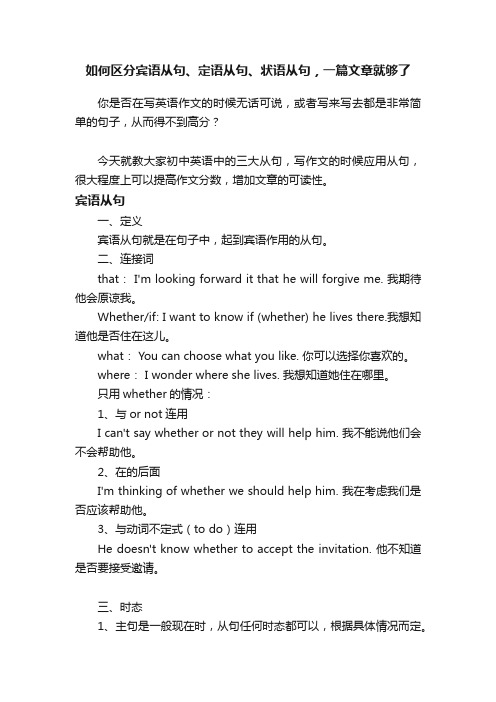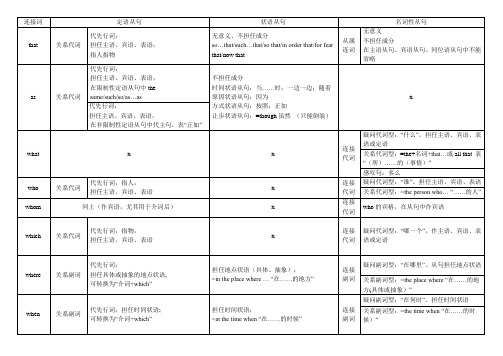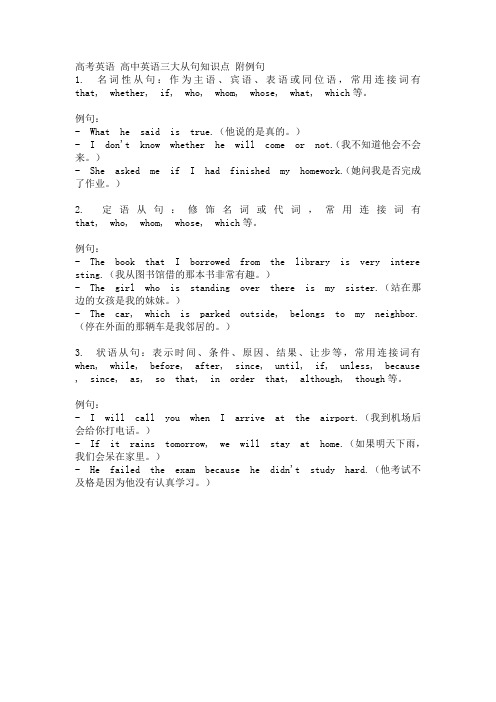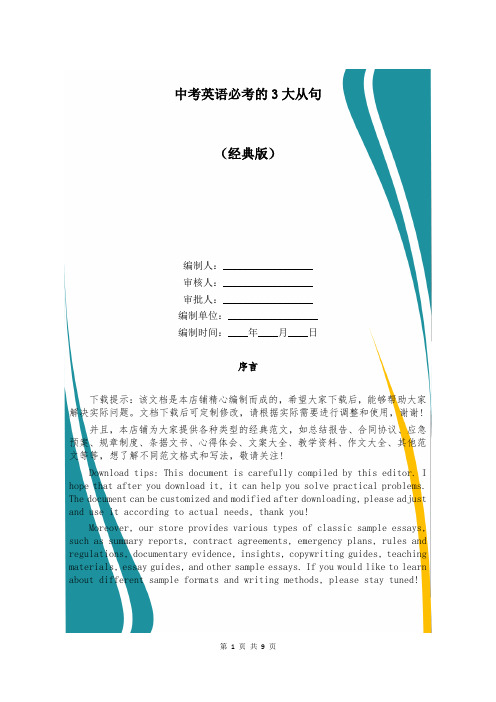英语三大从句的连接词
如何区分宾语从句、定语从句、状语从句,一篇文章就够了

如何区分宾语从句、定语从句、状语从句,一篇文章就够了你是否在写英语作文的时候无话可说,或者写来写去都是非常简单的句子,从而得不到高分?今天就教大家初中英语中的三大从句,写作文的时候应用从句,很大程度上可以提高作文分数,增加文章的可读性。
宾语从句一、定义宾语从句就是在句子中,起到宾语作用的从句。
二、连接词that: I'm looking forward it that he will forgive me. 我期待他会原谅我。
Whether/if: I want to know if (whether) he lives there.我想知道他是否住在这儿。
what: You can choose what you like. 你可以选择你喜欢的。
where: I wonder where she lives. 我想知道她住在哪里。
只用whether的情况:1、与or not连用I can't say whether or not they will help him. 我不能说他们会不会帮助他。
2、在的后面I'm thinking of whether we should help him. 我在考虑我们是否应该帮助他。
3、与动词不定式(to do)连用He doesn't know whether to accept the invitation. 他不知道是否要接受邀请。
三、时态1、主句是一般现在时,从句任何时态都可以,根据具体情况而定。
I wants to know what she has to take an examination.我想知道她有没有参加考试。
2、主句是一般过去时态,从句用相应的过去时态。
he said that he was a student. 他说他是一个学生。
he said that he would fly to Canada in a week. 他说他要飞到加拿大一个星期。
(完整版)三大从句中常用连接词的对比

连词,担任状语或表语
=no matter when无论何时
x
however
x
连词,担任状语或表语
=no matter how无论怎样
连接副词
较少,担任状语,如:I’ll give you however much money you need.
whether
x
引导让步状语从句,Whether…or…无论……还是……
从属连词
不担任成分;表“是否”
if
x
引导条件状语从句,表“如果”
从属连词
仅用于宾语从句,不担任成分;表“是否”
as if /as though
x
引导方式状语从句,表“似乎”
从属连词
用于表语从句,It seems/looks/appears as if …表“似乎”,
连接词
定语从句
状语从句
名词性从句
=anything that “任何……的事”
whoever
x
连词,担任主语、宾语、表语
=no matter who无论谁
连接代词
担任主语、宾语、表ຫໍສະໝຸດ ,=anyone who “任何……的人”
whomever
x
连词,担任宾语
=no matter whom无论谁
连接代词
担任宾语,
=anyone who “任何……的人”
whom
同上(作宾语,尤其用于介词后)
x
连接代词
who的宾格,在从句中作宾语
which
关系代词
代先行词;指物;
担任主语、宾语、表语
x
连接代词
疑问代词型:“哪一个”,作主语、宾语、表语或定语
英语中三大类从句

从句概述
• 从句只能做主句的某一部分,依附于主句 而存在,不能独立。
• 从句也具有句子的特征,即有自己的主 谓结构;而且带有引导词。
• 根据从句在句中的作用,可分为名词性 从句、形容词性(定语)从句和副词性 (状语)从句三类。
一、名词性从句
名词性从句包括主语从句、宾语从句、表语从句和同位语从句。其关 联词有连词that, if, whether;连接代词what, who, which和连接副 词when, where, why, how等。
Ryan was worrying about whether he had hurt her feelings. ⑶ or not紧随其后时;I don’t care whether or not he has a holiday. ⑷ 后接不定式时。 She can’t decide whether to go.
连接词的用法 (三)
3.Who, whom, whose, what, which
连接代词Who, whom, whose, what, which等 在从句中既起连接作用,又担当主语、宾语、表 语等成分,并保留其特殊疑问词词义。如:
No one knows who he was waiting for. Tell me whose house it is. Let me know which train you will be arriving on.
④ It +v. (seems / happened, etc. )+that-clause It seems that Alice is not coming to the party at all. It happened that I was out that day.
四六级语法:引导名词性从句的连接词

洛基英语,中国在线英语教育领导品牌引导名词性从句的连接词可分为三类:连接词:that,whether,if 不充当从句的任何成分)连接代词:what, whatever, who, whoever, whom,whose, which.连接副词:when, where, how, why不可省略的连词:1. 介词后的连词2. 引导主语从句和同位语从句的连词不可省略。
That she was chosen made us very happy.We heard the news that our team had won.比较:whether与if 均为"是否"的意思。
但在下列情况下,whether 不能被if 取代:1. whether引导主语从句并在句首2. 引导表语从句3. whether从句作介词宾语4. 从句后有"or not"Whether he will come is not clear.大部分连接词引导的主语从句都可以置于句末,用it充当形式主语。
It is not important who will go.It is still unknown which team will win the match.only if表示"只有";if only则表示"如果……就好了"。
If only也可用于陈述语气。
I wake up only if the alarm clock rings. 只有闹钟响了,我才会醒。
If only the alarm clock had rung.当时闹钟响了,就好了。
If only he comes early.但愿他早点回来。
“成千上万人疯狂下载。
更多价值连城的绝密英语学习资料,洛基内部秘密英语,技巧,策略请在网上申请报名”。
高中高考英语 语法知识 -三大从句(名词性从句,定语从句,状语从句) -2022年初升高英语衔接宝典

语法衔接-三大从句07名词性从句教材衔接知识链接一.主语从句主语从句是在复合句中充当主语的从句,通常放在主句谓语动词之前或由形式主语it代替,而本身放在句子末尾。
1.it作形式主语it作形式主语代替主语从句,主要是为了平衡句子结构,主语从句的连接词没有变化。
It is a pity that you didn't go to see the film.It doesn't interest me whether you succeed or not.2.用it作形式主语的结构(1)It is+名词+从句It is a fact that...事实是··...It is a surprise that...令人惊奇的是···..·(2)It is+形容词+从句It is strange that...奇怪的是···..·It is necessary that...有必要··...·It is important that...重要的是···..·(3)It+不及物动词十从句It seems that...似乎·.·..·It appears that...似乎···..·It happens that...碰巧·.·(4)It+过去分词+从句It is reported that...据报道······It is believed that...人们相信····.·It is known to all that...众所周知·····3.what与that在引导主语从句时的区别what引导主语从句时在从句中充当句子成分,如主语.宾语.表语,而that则不然。
高考英语 高中英语三大从句知识点 附例句

高考英语高中英语三大从句知识点附例句1. 名词性从句:作为主语、宾语、表语或同位语,常用连接词有that, whether, if, who, whom, whose, what, which等。
例句:- What he said is true.(他说的是真的。
)- I don't know whether he will come or not.(我不知道他会不会来。
)- She asked me if I had finished my homework.(她问我是否完成了作业。
)2. 定语从句:修饰名词或代词,常用连接词有that, who, whom, whose, which等。
例句:- The book that I borrowed from the library is very intere sting.(我从图书馆借的那本书非常有趣。
)- The girl who is standing over there is my sister.(站在那边的女孩是我的妹妹。
)- The car, which is parked outside, belongs to my neighbor.(停在外面的那辆车是我邻居的。
)3. 状语从句:表示时间、条件、原因、结果、让步等,常用连接词有when, while, before, after, since, until, if, unless, because , since, as, so that, in order that, although, though等。
例句:- I will call you when I arrive at the airport.(我到机场后会给你打电话。
)- If it rains tomorrow, we will stay at home.(如果明天下雨,我们会呆在家里。
)- He failed the exam because he didn't study hard.(他考试不及格是因为他没有认真学习。
初中英语语法三大从句总结,仅此一份,建议收藏!

在初中英语中,主要有三大从句,即宾语从句、定语从句、状语从句(包括时间、条件、结果、目的、原因、让步、地点、方式等)。
小编今天跟大家分享的就是这三个从句的主要语法点,赶快看起来吧!宾语从句一、定义在句子中起宾语作用的从句叫做宾语从句。
二、连接词that: I think that you can pass the exam.Whether/if: I don’t know what the word means.“Wh”: I don’t know what the word means.I don’t know where he found the book.只用whether的情况:1. 与or not连用:I don’t know whether it’s raining or not.2. 与动词不定式连用:He doesn’t know whether to accept the invitation.3. 连接词前有介词时:It depends on whether he is coming.三、时态1. 主句是一般现在时态,从句根据实际情况而定(各种时态均可)She wants to know what he has done for the exam.2.主句是一般过去时态,从句用相应的过去的时态。
1)She said that she was a student.2)She said that she would fly to Japan in a week.3)She said that she had finished her homework already.3. 如果宾语从句说的是客观真理、自然现象或事实时,这时宾语从句要用一般现在时态。
The teacher said that the earth goes round the sun.一、定义在复合句中修饰名词、代词的从句叫定语从句。
中考英语必考的3大从句

中考英语必考的3大从句(经典版)编制人:__________________审核人:__________________审批人:__________________编制单位:__________________编制时间:____年____月____日序言下载提示:该文档是本店铺精心编制而成的,希望大家下载后,能够帮助大家解决实际问题。
文档下载后可定制修改,请根据实际需要进行调整和使用,谢谢!并且,本店铺为大家提供各种类型的经典范文,如总结报告、合同协议、应急预案、规章制度、条据文书、心得体会、文案大全、教学资料、作文大全、其他范文等等,想了解不同范文格式和写法,敬请关注!Download tips: This document is carefully compiled by this editor. I hope that after you download it, it can help you solve practical problems. The document can be customized and modified after downloading, please adjust and use it according to actual needs, thank you!Moreover, our store provides various types of classic sample essays, such as summary reports, contract agreements, emergency plans, rules and regulations, documentary evidence, insights, copywriting guides, teaching materials, essay guides, and other sample essays. If you would like to learn about different sample formats and writing methods, please stay tuned!中考英语必考的3大从句中考英语必考的3大从句导语:宾语从句、状语从句和定语从句是初中阶段必须会学到的内容,从句对于同学们来说有一些难度,因为之前没有接触过这个名词。
- 1、下载文档前请自行甄别文档内容的完整性,平台不提供额外的编辑、内容补充、找答案等附加服务。
- 2、"仅部分预览"的文档,不可在线预览部分如存在完整性等问题,可反馈申请退款(可完整预览的文档不适用该条件!)。
- 3、如文档侵犯您的权益,请联系客服反馈,我们会尽快为您处理(人工客服工作时间:9:00-18:30)。
英语三大从句:名词从句(主语从句、宾语从句、表语从句和同位语从句)、定语从句、状语从句一、引导名词从句的连词从属连词that(可用于所有名词从句,一般可省略)、是否whether,if;疑问连词what, which, who/whom/whose;疑问副词when, where, why, how ——带特殊疑问句,陈述句语序(主+谓)、带不定式复合关系代词whatever, whoever, whomever, whichever, whenever, wherever, however——无论……二、定语从句引导词关系代词:人who (whom whose[后带名词]);事物which(必须的两种情况:有逗号,有介词)、that、as (such… as…,the same as…, 或者如…:与know, see, report, expect, hear,think, hope, wish, like, want, need 等词连用,一般在句首或者做插入语);关系副词when, where, why ——相当于介词+ which关系形容词whose[后带名词]三、带状语从句的连接词:because[biˈkɔz; (uS) biˈkɔːz] conj. 因为as[əz, æz] ad.& conj.像……一样;如同;因为prep. 作为,当做since [sins]ad. 从那时以来conj. 从…以来,…以后,由于prep. 从…以来for [fə(r), fɔː(r)] prep. 为了…;向…,往…;与…交换;防备…;适合…;因为…;在…期间;对于…;对…来说conj. 因为,由于so [səʊ]ad. 如此,这么;非常;同样conj. 因此,所以so that 以便;所以so…that…such… that…now that 既然;由于in order thatConsidering考虑到(一般在句首)Given 考虑到,鉴于(一般在句首)after[ˈɑːftə(r)]r ad. 在后;后来prep. 在…之后;在后面conj. 在…以后before[biˈfɔː(r)] prep. 在…以前;在…前面ad. 以前conj. 在…之前till [til] conj.& prep.直到,直到…为止until [ʌnˈtil] prep.& conj.直到…为止once [wʌns]n& ad. 一次,一度,从前conj. 一旦while [wail; (uS) hwail] conj.在…的时候,和…同时n 一会儿,一段时间when [wen] conj. 当…的时候ad. 什么时候,何时but [bət, bʌt] conj. 但是,可是prep. 除了, 除……外whatever [wɔtˈevə(r)] conj. & pron无论什么,不管什么however [haʊˈevə(r)] ad. 可是conj. 然而,可是,尽管如此whenever [wenˈevə(r)] conj. 每当,无论何时wherever [weərˈevə(r)] conj. 无论在哪里although[ɔːlˈðəʊ] conj. 虽然,尽管though[ðəʊ] conj. 虽然,可是even though 虽然,即使unless [ʌnˈles] conj. 如果不,除非or [ə(r), ɔː(r)] conj. 或;就是;否则that[ðæt] a.& pron那,那个conj. 那,那个(引导宾语从句等)ad. 那么,那样whether [ˈweðə(r); (uS) ˈhweðər] conj. 是否if [if] conj.如果,假使,是否,是不是provided that 如果;条件是(一般在句首)assuming that 假定…(一般在句首)or [ə(r), ɔː(r)] conj. 或;就是;否则either [ˈaiðə(r)] a. 两方任一方的;二者之一conj. 二者之一;要么……nor[nɔː(r)] conj. 也不neither conj. 也不;既不and[ænd] conj. 和;又;而[ənd,]than[ðen, ðæn] conj. 比even if 即使;虽然as if 犹如,好似as long as 只要;和…一样长so long as 只要英文连接词像胶水一样将相关联的句子连接起来,所以又被称为“胶水词”,胶水词就像英语的骨架一样重要,学会了胶水词,同时拥有词组的累积,你就可以轻松灵活的造出任何需要的长句,让你的英文交流如鱼得水。
下面让我们来熟悉一下常用的英语连接词包括哪些:(1)表示承接的过渡词:also,and,and then,too,in addition,furthermore,moreover,what's more, again,on top of that,another,first,second,third,fourth等。
(2)表示时间顺序的过渡词:now,then,before,after,afterwards,earlier,later,immediately,soon,next,in a few days,gradually,suddenly,finally等。
(但是你可以感受到这些词是副词,所以原词条对于“连接词”即连词是错误的)(3)表示空间顺序的过渡词:near(to),far(from),in front of,behind,beside,beyond,above,below,to the right/left,around,outside等。
(4)表示比较的过渡词:in the same way,just like,just as等。
(5)表示转折的过渡词:but,still,yet,however,never the less,none the less,on the contrary,in spite of/ in spite of the fact that,even though,although,despite / despite the fact that等。
(6)一方面,另一方面:on the one hand,on the other hand,for one thing,for another等。
(7)表示结果和原因的过渡词:because,since,so,as a result,therefore,then,furthermore,otherwise等。
(as a result ,therefore, thus并不是连词而是副词,所以经常是放句首,用逗号与后面句子隔开)(8)表示目的的过渡词:for this reason,for this purpose,so that,in order to等。
(9)表示强调的过渡词:in fact,indeed,surely,necessarily,certainly,without any doubt,truly,to repeat,above all,most important等。
(10)表示解释说明的过渡词:for example,in fact,in this case,for actually,for instance等。
(11)表示总结的过渡词:in a word,above all,,all in all,finally,at last,in conclusion,as I have shown,in anotherword,in brief,in short,in general,on the whole,as has been stated,last but not least, in addition等。
1、并列连词and 和,那么,渐渐;or 或,否则,不管是…,还是;but 但是,而是,的确…但;nor 也不so 也是,因此,所以,那么,这样看来;for 因为(表示推测),由于;2、相关连词both A and B 既是A又是B;either A or B 不是A 就是B;neither A nor B 既不是A也不是B ,两者皆非;not only A but also B 不但A而且B;A as well asB 不但A而且B , 与,和;3、准连词而且besides, furthermore, moreover, in addition;然而yet, still, however, nevertheless;否则else, otherwise;因此所以thus, hence, therefore, accordingly, consequently;4、引导名词从句的连词从属连词that(可用于所有名词从句,一般可省略)、是否whether,if;疑问连词what, which, who/whom/whose;疑问副词when, where, why, how ——带特殊疑问句,陈述句语序(主+谓)、带不定式复合关系代词whatever, whoever, whomever, whichever, whenever, wherever, however——无论….5、引导定语从句的连词关系代词:人who (whom whose[后带名词]);事物which(必须的两种情况:有逗号,有介词)、that、as (such… as…,the same as…, 或者如…:与know, see, report, expect, hear,think, hope, wish, like, want, need 等词连用,一般在句首或者做插入语);关系副词when, where, why ——相当于介词+ which关系形容词whose[后带名词]6、引导状语从句的连词表示时间when, while, as, till, whenever, since, as soon as…表示条件if, unless, as long as, in case, if only, on condition…表示结果so…that , such…that (如此…以至于);表示目的that, so that, in order that; lest, for fear, in case;表示原因as, because, now (that ), seeing (that), since…表示让步whether…or, notwithstanding, though, for all that…表示地点where, wherever, everywhere, anywhere表示方式as, as…so, as if, according as;表示比较than, the more…the more…, as…as…, not so…as;https:///s?id=1641361020842541244&wfr=spider&for=pc四、强调句由于强调句是对句子主语、宾语、状语等非谓语成分的强调,而不是修饰,通常不当做从句对待其句式为:It is/was ……. (被强调的句子成分) + that (被强调部分为人时用who)…….(原句剩余部分)原句:Tom usually plays basketball on weekends with his best friend.强调主语:It is Tom who usually plays basketball on weekends with his best friend.强调宾语:It is basketball that Tom usually plays on weekends with his best friend.强调状语:It is on weekends that Tom usually plays basketball with his best friend.强调状语:It is with his best friend that Tom usually plays basketball on weekends.强调谓语:通常只需在谓语前添加助动词do/does/ didTom usually does play basketball on weekends with his best friend.五、其他特别的从句1、部分形容词后面带that从句,往往带有情感情绪的I am sorry that…. I am afraid that…… I am so glad that…..2、类似主语从句的情况:It is a pity that….. It is a shame that…It is/was time that …..过去式….. It is time that we went to the meeting. = It is time to go to the meeting.3、时间与方式的个别情况:the moment that (that可省略)….. The moment that he came in we started the meeting.the way that (that可省略)….. We don’t like the way that he treats others.。
